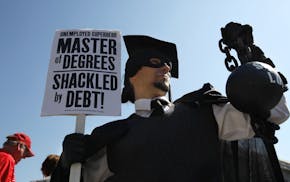Chief executives don't usually get a victory lap, and some of them don't deserve one.
3M's George Buckley does.
The blunt-spoken Brit, who is stepping aside later this month, revived and transformed 3M during his six years as its CEO. He pushed the Maplewood-based firm into new businesses and new geographies. He made 77 acquisitions, but he also accelerated growth in existing businesses by restoring the company's commitment to basic research and development and challenging 3M's scientists and engineers to deliver better results.
They responded. Sales of products developed in the past five years accounted for about 32 percent of 3M's revenue last year, up from 21 percent in 2005. The company is on pace to generate 40 percent of its sales from new product sales by 2016.
This is a remarkable achievement for any company, but especially a 110-year-old, $30 billion company that was demoralized and adrift in late 2005, when the unknown Buckley was the surprising pick to succeed the widely acclaimed W. James McNerney Jr.
McNerney, who bolted for Boeing after less than four years at 3M, was a Wall Street rock star. He had been a top executive at General Electric and a close associate of one of the most celebrated executives of the era, GE CEO Jack Welch. Losing the three-person race to succeed Welch did nothing to dim the luster. Indeed, he immediately became the top guy on everybody else's list.
3M's shares, which had lost 20 percent of their value during the late '90s, soared 11 percent on the day McNerney was named its first outside CEO.
There's no question 3M needed an outsider. The rapid growth and surging profits under Lew Lehr and Allen Jacobson during the '70s and '80s stalled during the 1990s, when another longtime insider, L.D. DeSimone, ascended to the top job.
Engineers and scientists grumbled about basic research being redirected toward product development, and the stock fell out of favor with investors.
But McNerney proved to be the wrong outsider. His cost-cutting zeal hurt product development and morale. His focus on processes, best exemplified by the widespread and costly implementation of a quality-and-training program called Six Sigma, may have improved manufacturing and financial efficiency but it slowed innovation, long the lifeblood for 3M. Six Sigma was also at the center of three age-discrimination lawsuits filed against the company by current and former workers, who alleged that the company used the program to shed older workers. The cases were eventually settled.
Like Lehr and Jacobson -- and in contrast with McNerney -- Buckley was an engineer. One of the first things he did after he arrived from Brunswick Corp. was to eliminate Six Sigma in 3M's research labs. He recognized that innovation is "an inherently messy process" that doesn't lend itself to the program's focus on precise measurement. Similarly, he loosened restrictions on how much time the firm's research scientists could focus on exploratory projects.
Here's how he put it in a Star Tribune interview after six months on the job: "This journey of scientific discovery, where it will walk down a pathway and make one discovery ... and naturally want to see the next one -- I like that kind of culture a great deal," he said. "I am an engineer. Those things are instinctual for someone like me."
Post-it Note inventor Art Fry, who retired from 3M in 1992 but still maintains close ties with company executives and researchers, was among those initially wary of Buckley's appointment. He had hoped the board of directors would pick an insider who understood what had been lost during McNerney's tenure.
Fry's take today: Buckley was the right guy after all.
"He was able to restore the old-time 3M culture fairly rapidly," Fry said Thursday. "The stagnation stopped, the morale went up, and the company got back into a growth mode."
I don't want to suggest that Buckley is a universally beloved figure at 3M. The company instituted wildly unpopular changes to benefit plans during his tenure that marked a final break with the old, paternalistic culture of 3M. Buckley reduced or eliminated stock option plans for managers, and ended the practice -- dating to the 1950s -- of issuing quarterly profit-sharing checks. 3M closed its pension plan to new hires, and last year stopped offering its company health insurance plan to retirees, giving them a sum of money to shop and buy insurance on the open market instead.
Buckley, who's never tried to hide his Tory leanings, also found himself in hot water last year after suggesting that 3M was more likely to expand outside of the United States because of the anti-business attitudes of President Obama.
It was a stupid thing to say, and it undermined what has actually been one of Buckley's signature achievements: 3M's much larger and stronger footprint in international markets. To his credit, Buckley recognized that 3M needed to be closer to its markets and customers to better compete against home-grown companies in those markets. He committed 3M to building plants, opening sales offices, hiring people and making acquisitions in those countries.
The bottom line is that the 3M Buckley leaves is much stronger than the one he inherited. Sure, he ruffled feathers and hurt some feelings along the way. But so did some of the company's other great CEOs.
ericw@startribune.com • 612-673-1736

Wieffering: Time to get over debit card fees
For Thrivent and others, warnings were there

With billions in sales, some co-ops are big business
